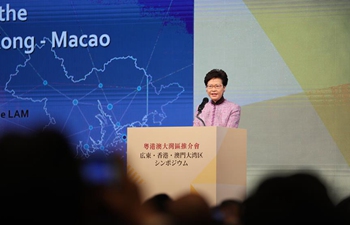SYDNEY, April 9 (Xinhua) -- Scientists from Australia and Singapore have created a quantum device capable of representing all possible futures in a simultaneous quantum superposition, a study revealed on Tuesday.
Inspired both by science fiction and the work of physics icon Richard Feynman, Assistant Professor Mile Gu from Singapore's Nanyang Technological University, conceived of the idea that a quantum computer could examine all possible futures by placing them in a superposition.
"When we think about the future, we are confronted by a vast array of possibilities," Gu explained.
"These possibilities grow exponentially as we go deeper into the future. For instance, even if we have only two possibilities to choose from each minute, in less than half an hour there are 14 million possible futures. In less than a day, the number exceeds the number of atoms in the universe."
Joining forces with a team from Australia's Griffith University, led by Professor Geoff Pryde, Gu and colleagues created a device capable of representing potential futures in the form of photons - quantum particles of light.
While currently limited to only 16 simultaneous futures, the team says that the device can in principle scale without bounds.
It is also capable of representing bias towards potential outcomes based on their probability of occurrence, helping researchers to understand how much that bias impacts the future as well as to provide a framework for some very innovative applications.
"Many current artificial intelligence (AI) algorithms learn by seeing how small changes in their behavior can lead to different future outcomes, so our techniques may enable quantum enhanced AIs to learn the effect of their actions much more efficiently," co-author Farzad Ghafari from Griffith University said.
The true potential of the breakthrough is yet to be seen however, because as the science tells us, the future is a vast range of possibilities.
"Just as few could imagine the many uses of classical computers in the 1960s, we are still very much in the dark about what quantum computers can do," Pryde said.













